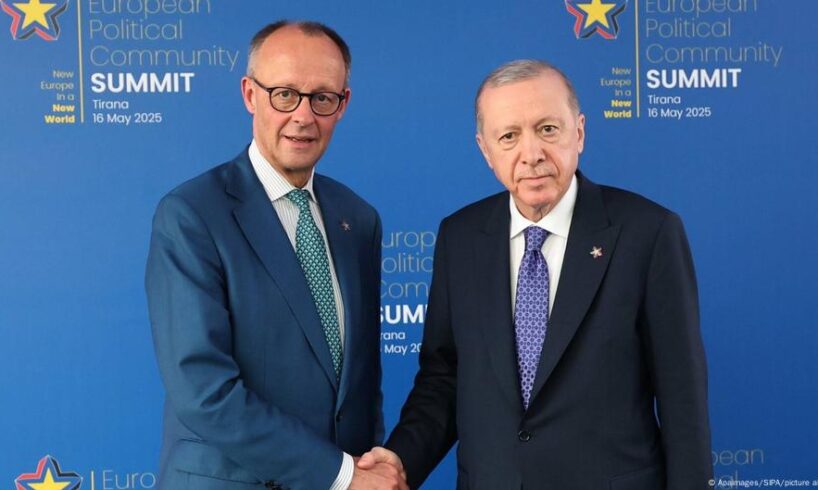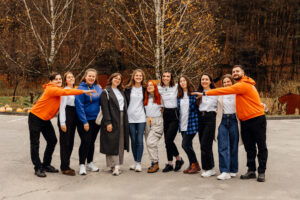
Germany and Turkey have shared a politically tense relationship for years — almost as if by tradition. What can Chancellor Friedrich Merz’s visit to Ankara achieve?
“The focus is on the bilateral conversation with Mr. Erdogan.” That was all Deputy Government Spokesperson Steffen Meyer offered at this week’s press conference in Berlin when asked about the chancellor’s upcoming two-day visit to Turkey, which begins on Wednesday.
Meyer described it as an “inaugural visit” to Turkish President Recep Tayyip Erdogan, noting that “a small program would surround it.”
Since taking office, Merz has had brief encounters with Erdogan on the international stage, including one in Tirana, Albania, in May.
How Turkish people in Germany view Turkey’s protests
To view this video please enable JavaScript, and consider upgrading to a web browser that supports HTML5 video
A history of bilateral meetings
Former Chancellor Olaf Scholz made his “inaugural visit” to Turkey in March 2022, just three months after taking office, when he visited the Turkish capital for a single day. Scholz’s predecessor Angela Merkel, by contrast, traveled to Istanbul and Ankara in 2006, eleven months into her tenure.
What these three chancellors share is a reliance on Turkey, shaped by distinct political circumstances. For Merkel, it was the refugee influx of 2015; for Scholz, the outbreak of Russia’s war against Ukraine in February 2022; and for Merz, Ankara’s potential role as a mediator in both the Ukraine war and the Gaza conflict.
A glance further back reveals just how much the dynamics have shifted. Helmut Kohl, who served as chancellor from 1982 to 1998, waited nearly three years before making his first visit to Turkey. His successor, Gerhard Schröder, who led Germany from 1998 to 2005, delayed his first visit by five and a half years.
This retrospective also underscores one of the enduring and unresolved controversies: Turkey’s bid to join the European Union (EU). Turkey is a key NATO ally, yet it is still far from joining the EU.
Ankara submitted its application back in 1999, but Germany has consistently met the ambition with skepticism — much to Turkey’s frustration. Formal accession talks began in 2005, yet they have been stalled for years.
EU looking to deepen defense ties with Turkey
To view this video please enable JavaScript, and consider upgrading to a web browser that supports HTML5 video
Political scientist Yasar Aydin, a researcher at the Center for Applied Turkey Studies (CATS) within the German Institute for International and Security Affairs (SWP), observes that Germany’s stance on Turkey has changed. In recent years, a “pragmatic and transactional relationship” has been established between Berlin and Ankara, grounded in geopolitical and strategic power dynamics, Aydin told DW.
According to Aydin, the turning point in German-Turkish relations was Chancellor Merkel’s 2016 “refugee deal,” which helped ease domestic tensions in Germany. Later, other geopolitical challenges emerged.
“It’s a give and take,” Aydin remarked. The relationship has evolved “toward a kind of symmetry.” Unlike during Chancellor Kohl’s tenure, when Germany maintained a restrictive arms policy toward Turkey, today’s approach is notably more open.
Power and pragmatism
What might Chancellor Merz’s visit offer the Turkish president? Aydin points first to the symbolism of power.
Just this Monday, British Prime Minister Keir Starmer was in Ankara. Notably, he declined to meet with representatives of the opposition Cumhuriyet Halk Partisi (CHP) — Labour’s social democratic sister party. Instead, Starmer and Erdogan ceremoniously signed an agreement for Turkey to purchase 20 Eurofighters from the United Kingdom.
Aydin also underscores Germany’s significance as the EU member state with the largest population, home to more than three million Turkish migrants and serving as the most important export market for Turkish goods. Erdogan is hoping for a modernization of the customs union with the EU.
In matters of European policy and Ankara’s influence on Turkish migrants in Germany, the center-right Christian Democratic Union party and its Bavarian sister party, the Christian Social Union, have long taken a critical stance toward Turkey’s political trajectory.
Restrictions on democratic rights and the suppression of opposition voices in Turkey have deepened this skepticism.
Green Party politician Annalena Baerbock, who served as Germany’s foreign minister until early May 2025, repeatedly drew Ankara’s ire with pointed public criticism.
A focus on economy, migration, and security
According to government sources in Berlin, Merz’s visit will center on strengthening cooperation in the areas of economy, migration, and security — domains that mirror today’s most pressing challenges.
Just eleven days ahead of the chancellor, German Foreign Minister Johann Wadephul made his own inaugural visit to Ankara. Both Merz and Wadephul belong to the CDU, the senior partner in Germany’s center-right political alliance. Wadephul may have prepared the ground for Merz’s arrival.
The foreign minister emphasized Turkey’s importance as a key partner and NATO ally. The main topics of discussion during his meetings were the situation in Gaza and Russia’s war against Ukraine. Public criticism was minimal.
Germany’s public broadcaster ARD reported that Wadephul said Germany is seeking progress in EU-Turkey relations.
“We want an update of the customs union, we want visa liberalization. Above all, we want a positive agenda,” he said.
This article was originally written in German.





